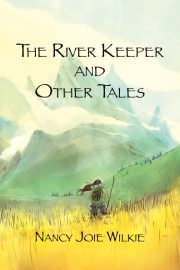More Writerly Than Thou
by Sandra M. Odell
 I have struggled with the titanic highs and crushing lows of severe mental illness and PTSD most of my life, yet nothing quite prepared me for the psyche shitstorm that followed the release of my second collection, Godfall & Other Stories. The book was released to positive reviews, including a starred review from Publisher’s Weekly, and I was both humbled and amazed that complete strangers liked my work enough to share it with their friends. I was so excited and confused, I couldn’t write. Not to worry; the words would come back, the sleepless nights and sudden panic attacks would pass. Other people experienced a similar reaction, I read about it all the time, but each of them pushed through and eventually started writing again. I would, too.
I have struggled with the titanic highs and crushing lows of severe mental illness and PTSD most of my life, yet nothing quite prepared me for the psyche shitstorm that followed the release of my second collection, Godfall & Other Stories. The book was released to positive reviews, including a starred review from Publisher’s Weekly, and I was both humbled and amazed that complete strangers liked my work enough to share it with their friends. I was so excited and confused, I couldn’t write. Not to worry; the words would come back, the sleepless nights and sudden panic attacks would pass. Other people experienced a similar reaction, I read about it all the time, but each of them pushed through and eventually started writing again. I would, too.
Days turned into weeks, turned into months, and still no words came. I vacillated between a debilitating panic that had me sobbing in my closet and a depression that revealed itself as a heightened suicidal ideation and an increase in self-harm. Every personal demon I’d ever had came home to roost. Desperate to break free of the cycle, I took a chance. I reached out to other writers to share my fears, hoping to find understanding. What I found instead was a crush of “What are you complaining about? Your book was a success! I write every day. If I can’t write on the computer, I write by hand. If I can’t write by hand, I hold the stick in my teeth and write in the sand. 100, 1000, 5000, 10,000 words a day! Real writers write! JUST START WRITING AGAIN!”
No. Please, no.
Depression and other forms of mental illness are familiar to many in the writing community. We white knuckle or seek therapy, research medical interventions or self-medicate. It is easier to maintain a happy or “mildly depressed” public face than it is to admit we need help. When we do reach out, some writers seek to encourage with their own measures of success and failure. This well-intentioned effort frequently does more harm than good and can compound the problem. Am I saying that you should never commiserate or offer enthusiastic advice? Not at all. What I am saying is that you should pay attention to what another writer is saying, and in some instances not saying, before presenting your yardstick of success.
We all want to help. The writer’s life is often fraught with doubts and insecurities so we lift one another up as best we can, celebrating every sale, commiserating with the rejections and setbacks. What matters is how you offer support. Check yourself before your messages of encouragement and solidarity become a repetition of unintentional judgment. What do you mean to say? Do you hope to encourage or empathize? Have you inadvertently positioned your own experiences before those of the other person? Is your measure of success a surefire formula or ritual everyone should follow? What about your tone in the realm of social media? Can you support without offering advice? Empathize without judgment? Are you listening or simply waiting to talk?
The after book blahs had become tangled in the web of my mental illness. So many writers, some my closest friends, sought to help by applying the panacea of one-word-then-the-next that I nearly suffocated beneath the weight of my own failure and self-loathing because I couldn’t keep up. I would never write again, the success of my collection was a fluke, I’d failed my agent and my friends, the stories were worthless, and no one would miss me when I was gone. I almost missed the voices I needed to hear most. “Are you okay? How can I help?”
Almost.
Help came from an unexpected source. I applied for the SFWA mentorship program, certain I was too broken to find a match. To my surprise, I was paired with a mentor familiar with the bitter trials of writing and mental illness. My mentor allowed me to lead the conversation, asked gentle, non-judgemental questions, and shared their own struggles with post-publication depression and tips on what had worked for them to set priorities and reclaim their words. The idea that more experienced writers could be paired with those seeking to learn more about how to manage their craft had proven itself. After our first email exchange, I cried for an hour. I was no longer alone.
It has been nine months since the release of my collection. Since those first emails with my mentor, I have slowly, hesitantly returned to the page. This is the longest piece I have written at the cost of weeks of tears, panic, and desperation. I heard the kindness of others. I can now look at a blank page without stress vomiting. My stories don’t, quite, suck. I am a writer.
Before you encourage someone to write faster, better, more successfully, ask yourself if that’s what you mean to say. More importantly, ask if that’s what they need to hear.
•••
Sandra lives in Washington state with her family and an Albanian miniature moose disguised as a dog. She is queer, disabled, and advocates for LGBTIA+ and disability rights. Her work has appeared in such venues as Crossed Genres, Daily Science Fiction, Galaxy’s Edge, and three of the four Escape Artists podcasts. She is represented by Caitlin M. McDonald at the Donald Maass Literary Agency. Her short story collection Godfall & Other Stories was released in 2018 by Hydra House Books. You can support her writing at www.patreon.com/


